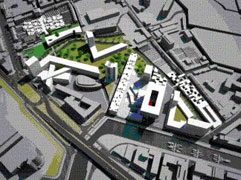Energy Hub: information networks, heat networks, power networks

Energy-Hub for residential and commercial districts and transport
The Energy Hub is a collaborative €11.66 million European project, part funded by the EU, which aims to demonstrate the full potential of renewable energy by providing 100% on-site renewable energy within an "Energy Hub District". ICAX has been invited to join the collaborative project for its expertise in pavement solar thermal collectors.
An Energy Hub is a physical cross point, similar to an energy station, in which energy and information streams are coordinated, and where different forms of energy (heat, electricity, chemical, biological) are converted between each other to meet current demands, or are stored for later use.
The Energy Hub exchanges energy via the energy grids between its members (households, renewable energy plants, offices), who may be both consumers and suppliers. The members exchange information on their energy production and energy needs with the Energy Hub. The Hub then distributes the available energy in the most efficient way.
To match supply and demand, the Energy Hub converts and stores energy and performs load shifting. The members will be connected to the Energy Hub by means of bi-directional energy grids (low and high temperature heat grids, electrical grids (AC and DC) and gas grids (hydrogen, biogas, syngas).
Renewable energy may be generated by individual members (e.g. from PV or solar thermal collectors on roofs) or by central means (a ground source energy or a large combined heat and power plant) located within the district that may be fueled by solar energy, biofuel or hydrogen.
Central to the E-Hub project is the Multi Commodity Matcher: this smart controller allocates energy dynamically to its most demanding members from the most efficient sources of supply.
The E-Hub project brochure illustrates the ideas being studied in the E-Hub project.
ICAX contributes expertise in Solar Roads
ICAX has joined the project to contribute its experience on collecting solar energy from road surfaces in summer, thermal modelling of assessing heat collection from an array of pipes embedded in road surfaces and heat distribution to road surfaces to prevent ice forming on roads in winter.
District Heating and Cooling from On-Site Renewable Energy
The Energy Hub idea covers all types of energy flow, from heating and cooling to electricity, biogas and hydrogen, and may be connected not only to households but also to (electric) cars, commercial buildings and industry.
The aim of the project is to develop the Energy Hub as a system, to develop technologies that are needed to achieve the system successfully, to develop business models in order to overcome institutional and financial barriers, and to demonstrate a live Energy Hub with further feasibility studies to extend the principle.
The Energy Hub project aims to harness renewable energy, to engineer low carbon communities and to connect know-how for a sustainable world.
ICAX joins a distinguished group of companies from across the European Union researching into a successful Energy Hub District, led by TNO of the Netherlands.
| Role | ||||
 |
TNO | Nederlandse Organisatie voor Toegepast natuurwetenschappelijk Onderzoek | The Netherlands | Project Manager |
 |
ECN | Energy Research Centre of the Netherlands | The Netherlands | Techniques development |
 |
D'Appolonia | D'Appolonia SPA | Italy | System definition |
 |
Finlombarda | FinLombarda SPA | Italy | Feasibility studies |
 |
Acciona | Acciona Infraestructuras s.a. | Spain | Energy conversion and storage |
 |
Solintel | Solintel M & P SL | Spain | Techniques development |
 |
ICAX | ICAX Ltd | UK | Pavement solar collectors |
 |
HSW | H.S.W. Ingenieurbuero fuer Angewandte und Umweltgeologie GmbH | Germany | Thermal foundations |
 |
Mostostal | Mostostal Warszawa SA | Poland | Thermoactive foundations |
 |
VITO | Vlaamse Instelling voor Technologisch Onderzoek | Belgium | Energy management systems |
 |
Fraunhofer | Fraunhofergesellschaft zur Foerderung der Angewandten Forschung E.V. | Germany | Energy management systems |
 |
TPG | TPG / University of Genoa | Italy | Integrated energy networks |
 |
Ertzberg | Ertzberg CVBA | Belgium | Demonstration at Tweewaters |
 |
VTT | Valtion Teknillinen Tutkimuskeskus | Finland | Business strategies |
 |
ISPE | Intesa Sanpaolo Eurodesk S.P.R.L | Belgium | Business strategies |
 |
EDF | Electricite de France | France | Energy advisory |
Renewable Energy Systems - Wide ranging research project
The research group is exploring many ideas to achieve its aims of local generation and sharing of energy, including:
Energy capture:
Carbon FRP composites
thermo active foundations - energy piles
thermal road solar collector systems
Quartzite aggregates
Energy generation and conversion:
CHP - combined heat and power
distributed generation of electricity and heat
generation within the built environment
electrolysis for the production of hydrogen
Energy storage:
thermochemical seasonal thermal storage
borehole thermal energy storage
solid salt hydrates
Energy balance is the ideal form of heating and cooling
balanced seasonal operation of heating and cooling
Distributed heat storage
Thermochemical sorption storage
The effectiveness of CHP is only feasible in combination with thermal energy storage
High energy density materials
Advanced compact thermal energy storage
Zeolite thermal storage
Energy delivery:
exchange of energy within buildings
Exchange of heat between buildings: anIntranet of Heat
Energy balancing:
fluctuating character of supply
balancing demand control by load shifting
Ground Source Heating and Cooling
Energy control:
"PowerMatcher" coordinates supply and demand for electricity within networks
"Intelligator" coordinates supply and demand for heat and electricity within district networks
District energy management system
bi-directional energy grids
matching energy demand with supply
matching energy supply with demand
balancing energy demand by load shifting
smart energy networks - smart grids
Business Models for district heating and energy control:
District energy simulation tools for assessing needs
Agent based technology
Smart energy business and service models
Bringing together sustainable technologies
See Ground Source Heating See Ground Source Cooling See Ground Source Energy

